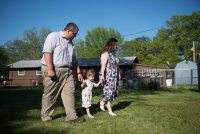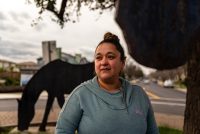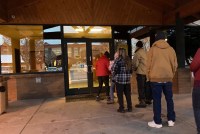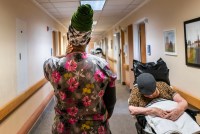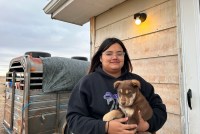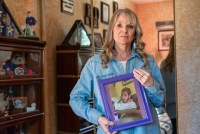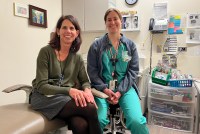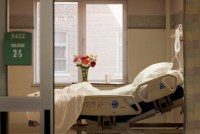Latest KFF Health News Stories
Federal Panel Prescribes New Mental Health Strategy To Curb Maternal Deaths
The leading causes of pregnancy-related deaths in the United States — including suicides and fatalities linked to substance use disorders — stem from mental health conditions. Now a federal task force has recommended strategies to help women who are at risk during or after pregnancy.
Tribal Nations Invest Opioid Settlement Funds in Traditional Healing To Treat Addiction
Hundreds of Native American tribes are getting money from settlements with companies that made or sold prescription painkillers. Some are investing it in sweat lodges, statistical models, and insurance-billing staffers.
Their First Baby Came With Medical Debt. These Illinois Parents Won’t Have Another.
Millions of new parents in the U.S. are swamped by medical debt during and after pregnancy, forcing many to cut back on food, clothing, and other essentials.
California Floats Extending Health Insurance Subsidies to All Adult Immigrants
The legislature is considering taking the first steps to make Covered California plans available to immigrants without permanent legal status. The state has already extended Medi-Cal coverage to low-income immigrants.
Bird Flu Is Bad for Poultry and Dairy Cows. It’s Not a Dire Threat for Most of Us — Yet.
Cattle across the country are infected by the H5N1 bird flu. The virus isn’t spreading among people — but if it evolves to do that, fears of another pandemic could be realized.
Exposed to Agent Orange at US Bases, Veterans Face Cancer Without VA Compensation
The Department of Veterans Affairs has long given vets who served in Vietnam disability compensation for illness connected to Agent Orange harm. But those exposed at U.S. bases are still waiting for the same benefits.
Mandatory Reporting Laws Meant To Protect Children Get Another Look
The state is looking at ways to weed out false reporting of child abuse and neglect as the number of reports reaches a record high.
Tire Toxicity Faces Fresh Scrutiny After Salmon Die-Offs
Tires emit huge volumes of particles and chemicals as they roll along the highway, and researchers are only beginning to understand the threat. One byproduct of tire use, 6PPD-q, is in regulators’ crosshairs after it was found to be killing fish.
Unsheltered People Are Losing Medicaid in Redetermination Mix-Ups
Some of the nearly 130,000 Montanans who have lost Medicaid coverage as the state reevaluates eligibility are homeless. That’s in part because Montana kicked more than 80,000 people off the program for technical reasons rather than income ineligibility. For unhoused people who were disenrolled, getting back on Medicaid can be extraordinarily difficult.
Biden Administration Sets Higher Staffing Mandates. Most Nursing Homes Don’t Meet Them.
The staffing regulation was disparaged by the industry as unattainable. Patient advocates say it doesn’t go far enough. Labor unions welcomed the requirement.
Rural Jails Turn to Community Health Workers To Help the Newly Released Succeed
To reduce recidivism, some rural counties are hiring community health workers or peer support specialists to connect people leaving custody to mental health resources, substance use treatment, medical services, and jobs.
Native Americans Have Shorter Life Spans. Better Health Care Isn’t the Only Answer.
Social services, such as parenting classes and economic development programs, can help increase the life spans of Native Americans, some health experts say. But insurers don’t always cover these services.
Rural Americans Are Way More Likely To Die Young. Why?
Three words are commonly repeated to describe rural America and its residents: older, sicker and poorer. Obviously, there’s a lot more going on in the nation’s towns than that tired stereotype suggests. But a new report from the Agriculture Department’s Economic Research Service gives credence to the “sicker” part of the trope. Rural Americans ages […]
Swap Funds or Add Services? Use of Opioid Settlement Cash Sparks Strong Disagreements
The national opioid settlements don’t prohibit using money for initiatives already supported by other means, but doing so could dilute the impact.
Arkansas Led the Nation in Measuring Obesity in Kids. Did It Help?
For more than 20 years, children in Arkansas have been measured in school as part of a statewide effort to reduce childhood obesity. But the letters have had no impact on weight loss — and obesity rates have risen. Still, the practice of sending letters has spread to other states.
After Uphill Battle, Company Is Poised for Takeover of Bankrupt California Hospital
American Advanced Management, a steadily growing operator of small hospitals, is expected to get the green light from a bankruptcy court next week to take over the shuttered Madera Community Hospital. Some community groups worry about the company’s track record.
Congress Likely to Kick the Can on Covid-Era Telehealth Policies
With an end-of-year deadline and a presidential election approaching, payment rules that fueled rapid expansion of telehealth in the United States face a last-minute congressional decision.
Doctors Take On Dental Duties to Reach Low-Income and Uninsured Patients
More doctors are integrating oral health care into their practices, filling a need in America’s dental deserts.
Médicos de atención primaria asumen tareas de dentista para ayudar a pacientes vulnerables
En Denver, la inestabilidad de la vivienda, las barreras del idioma, la falta de transporte y el “costo astronómico” de la odontología sin seguro hacen que la atención dental sea inaccesible para muchos nuevos inmigrantes.
City-Country Mortality Gap Widens Amid Persistent Holes in Rural Health Care Access
People in their prime working years living in rural America are 43% more likely to die of natural causes, like diseases, than their urban counterparts, a disparity that grew rapidly in recent decades, according to a new federal report.





